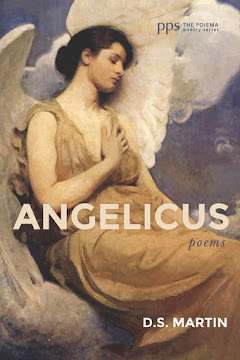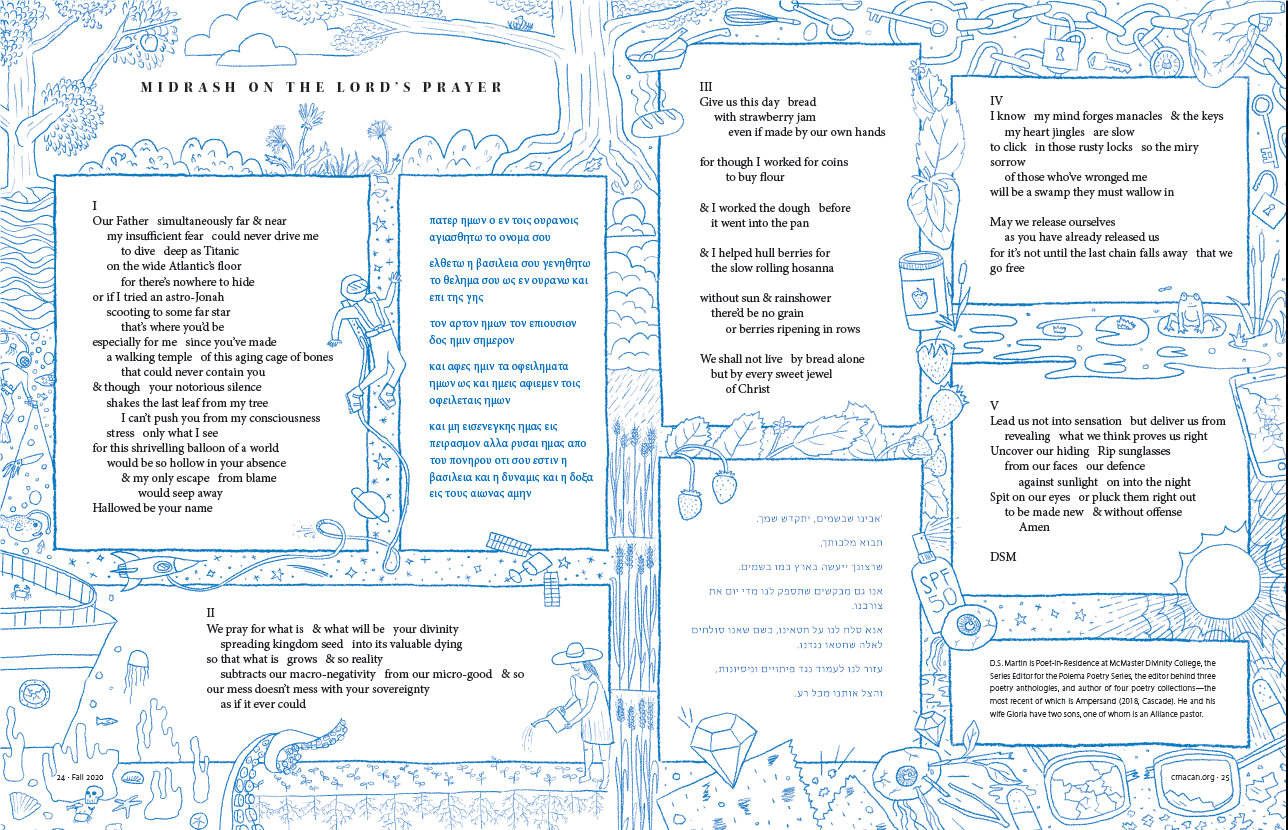Pádraig J. Daly is an Irish poet and Augustinian friar in Dublin. He has written eleven poetry collections including, Nowhere But in Praise (1978), The Last Dreamers: New & Selected Poems (1999), The Other Sea (2003), and Afterlife (2010). His most recent book is God in Winter (2015, Dedalus Press).
John F. Deane wrote of God in Winter: "Daly’s poems affirm hope...a hope that does not ignore our present reality, in poems that focus on the actuality of incarnation, where God is divined in everyday living. These are poems that eschew mere devotion, but whose breathing rhythms and beautifully-modulated music, touch the deepest and most valuable heart-strings."
Pádraig J. Daly has also translated poetry into English from Italian — Edoardo Sanguineti, (Libretto), and Paolo Ruffilli (Joy and Mourning) — and from Irish.
The following poem first appeared in Image, and has since appeared in Poetry Daily.
Mary
If she had said, No,
The world would not have stopped:
Birds would have flown high still into sky,
The heavens would have proclaimed his glory
And the firmament the work of his hands.
We would have gone on reproving him,
Unaware of how deeply down
His love might plunge into our affliction,
Unaware of how he might have taken upon himself
The consequences of our nos.
This is the first Kingdom Poets post about Pádraig J. Daly: second post.
Entry written by D.S. Martin. His latest poetry collection, Conspiracy of Light: Poems Inspired by the Legacy of C.S. Lewis, is available from Wipf & Stock as is his earlier award-winning collection, Poiema.
Monday, November 28, 2016
Monday, November 21, 2016
Rosalia de Castro
Rosalia de Castro (1837—1885) is a poet who wrote in the Galician language of Northwest Spain, as well as in Spanish. She was born in scandal as the illegitimate daughter of a priest. In 1863 her first poetry collection, Galician Songs, was published on the 17th of May—a date still celebrated as Galician Literature Day. Her book helped the cause of reinstating the Galician language for literary purposes.
Seventeen years later her book New Leaves appeared—a book where she identifies closely with widows, orphans and other destitute individuals.
------When the North Wind blows cold
------and a fire warms our home,
------they pass by my door—
------thin, naked, and hungry—
------and my spirit becomes frozen
------like their bodies.
These homeless become a symbol of Galician poverty. In her latter poetry she also became tormented by spiritual doubts, often crying out in her poetry for God to restore her faith—a prayer that seems to have been answered before her death.
Federico Garcia Lorca is one of the twentieth century poets whose attention to her poetry helped to re-establish her literary reputation.
The following is from the English-language collection of her work, Poems, edited and translated by Anna-Marie Aldaz, Barbara N. Gantt, and Anne C. Bromley.
God Placed A Veil
God placed a veil
over our hearts,
a veil that conceals an abyss
that only He can see.
When I consider what would be revealed
about the one I adore —
humble and on my knees
as one worships the Lord —
if this veil were to drop
suddenly between the two of us,
I tremble...and bowing my head,
I say, "How wise is God!"
Entry written by D.S. Martin. His latest poetry collection, Conspiracy of Light: Poems Inspired by the Legacy of C.S. Lewis, is available from Wipf & Stock as is his earlier award-winning collection, Poiema.
Seventeen years later her book New Leaves appeared—a book where she identifies closely with widows, orphans and other destitute individuals.
------When the North Wind blows cold
------and a fire warms our home,
------they pass by my door—
------thin, naked, and hungry—
------and my spirit becomes frozen
------like their bodies.
These homeless become a symbol of Galician poverty. In her latter poetry she also became tormented by spiritual doubts, often crying out in her poetry for God to restore her faith—a prayer that seems to have been answered before her death.
Federico Garcia Lorca is one of the twentieth century poets whose attention to her poetry helped to re-establish her literary reputation.
The following is from the English-language collection of her work, Poems, edited and translated by Anna-Marie Aldaz, Barbara N. Gantt, and Anne C. Bromley.
God Placed A Veil
God placed a veil
over our hearts,
a veil that conceals an abyss
that only He can see.
When I consider what would be revealed
about the one I adore —
humble and on my knees
as one worships the Lord —
if this veil were to drop
suddenly between the two of us,
I tremble...and bowing my head,
I say, "How wise is God!"
Entry written by D.S. Martin. His latest poetry collection, Conspiracy of Light: Poems Inspired by the Legacy of C.S. Lewis, is available from Wipf & Stock as is his earlier award-winning collection, Poiema.
Monday, November 14, 2016
Robert Fitzgerald
Robert Fitzgerald (1910—1985) is well known for his verse translations of Homer's The Odyssey and The Iliad. He also translated works by Sophocles, Euripides, and Virgil. His career began in journalism, working at the New York Herald Tribune and at Time Magazine. Later he held teaching positions at such schools as Princeton and Harvard.
He and his wife Sally edited two of Flannery O'Connor's books. He was also appointed in 1984 to the position now known as the Poet Laureate of the United States.
He expressed his philosophy as:
------"So hard at best is the lot of man, and so great is the beauty he
------can apprehend, that only a religious conception of things can take
------in the extremes and meet the case. Our lifetimes have seen the
------opening of abysses before which the mind quails. But it seems to
------me there are a few things everyone can humbly try to hold onto:
------love and mercy (and humor) in everyday living; the quest for exact
------truth in language and affairs of the intellect; self-recollection
------or prayer; and the peace, the composed energy of art."
The following poem comes from Fitzgerald's fourth poetry collection Spring Shade: Poems, 1931—1970.
Solstitium Saeculare
Winter blows on my eaves,
And dry stalks nod in the snow
Pitted by dripping trees.
The strong sun, brought low,
Gives but an evening glare
Through black twigs' to-and-fro
At noon in the cold air.
A rusty windmill grates.
I sit in a Roman chair,
Musing upon Roman fates,
And make peace with Rome
While the solar Fury waits.
I hold my peace at home
And call to my wondering mind
The chaos I came from—
Waste sea and ancient wind
That sailing long I fought,
Unshriven and thin-skinned.
God knows why I perished not,
But made it here by grace
To harbor beyond my thought,
To the stillness of this place.
Here while I live I hold
Young hope in one embrace
With all the ruin of old,
And bless God's will in each;
And bless His word of gold.
Entry written by D.S. Martin. His latest poetry collection, Conspiracy of Light: Poems Inspired by the Legacy of C.S. Lewis, is available from Wipf & Stock as is his earlier award-winning collection, Poiema.
He and his wife Sally edited two of Flannery O'Connor's books. He was also appointed in 1984 to the position now known as the Poet Laureate of the United States.
He expressed his philosophy as:
------"So hard at best is the lot of man, and so great is the beauty he
------can apprehend, that only a religious conception of things can take
------in the extremes and meet the case. Our lifetimes have seen the
------opening of abysses before which the mind quails. But it seems to
------me there are a few things everyone can humbly try to hold onto:
------love and mercy (and humor) in everyday living; the quest for exact
------truth in language and affairs of the intellect; self-recollection
------or prayer; and the peace, the composed energy of art."
The following poem comes from Fitzgerald's fourth poetry collection Spring Shade: Poems, 1931—1970.
Solstitium Saeculare
Winter blows on my eaves,
And dry stalks nod in the snow
Pitted by dripping trees.
The strong sun, brought low,
Gives but an evening glare
Through black twigs' to-and-fro
At noon in the cold air.
A rusty windmill grates.
I sit in a Roman chair,
Musing upon Roman fates,
And make peace with Rome
While the solar Fury waits.
I hold my peace at home
And call to my wondering mind
The chaos I came from—
Waste sea and ancient wind
That sailing long I fought,
Unshriven and thin-skinned.
God knows why I perished not,
But made it here by grace
To harbor beyond my thought,
To the stillness of this place.
Here while I live I hold
Young hope in one embrace
With all the ruin of old,
And bless God's will in each;
And bless His word of gold.
Entry written by D.S. Martin. His latest poetry collection, Conspiracy of Light: Poems Inspired by the Legacy of C.S. Lewis, is available from Wipf & Stock as is his earlier award-winning collection, Poiema.
Monday, November 7, 2016
Oscar Wilde
Oscar Wilde (1854—1900) is perhaps the greatest wit of the 19th century. He is the author of such plays as The Importance of Being Earnest, Lady Windermere's Fan, and A Woman of No Importance — and of the novel The Picture of Dorian Gray.
Notorious for having being prosecuted for "acts of gross indecency with other male persons", for having made frivolous comments about the charges themselves in court, and for his conviction and subsequent imprisonment — Wilde is also known for his deathbed conversion. In his poem "Ballad of Reading Gaol", Wilde wrote:
-----------"Ah! Happy they whose hearts can break
-----------And peace of pardon win!
-----------How else may man make straight his plan
-----------And cleanse his soul from Sin?
-----------How else but through a broken heart
-----------May Lord Christ enter in?"
His long interest in Catholicism is shown through such flippant comments as saying the Catholic Church is "for saints and sinners alone — for respectable people, the Anglican Church will do". The following poem, from 1881, also demonstrates that Wilde had long considered the truth that salvation comes through Christ alone.
E Tenebris
Come down, O Christ, and help me! reach thy hand,
For I am drowning in a stormier sea
Than Simon on thy lake of Galilee:
The wine of life is spilt upon the sand,
My heart is as some famine-murdered land,
Whence all good things have perished utterly,
And well I know my soul in Hell must lie
If I this night before God's throne should stand.
'He sleeps perchance, or rideth to the chase,
Like Baal, when his prophets howled that name
From morn to noon on Carmel's smitten height.'
Nay, peace, I shall behold before the night,
The feet of brass, the robe more white than flame,
The wounded hands, the weary human face.
Entry written by D.S. Martin. His latest poetry collection, Conspiracy of Light: Poems Inspired by the Legacy of C.S. Lewis, is available from Wipf & Stock as is his earlier award-winning collection, Poiema.
Notorious for having being prosecuted for "acts of gross indecency with other male persons", for having made frivolous comments about the charges themselves in court, and for his conviction and subsequent imprisonment — Wilde is also known for his deathbed conversion. In his poem "Ballad of Reading Gaol", Wilde wrote:
-----------"Ah! Happy they whose hearts can break
-----------And peace of pardon win!
-----------How else may man make straight his plan
-----------And cleanse his soul from Sin?
-----------How else but through a broken heart
-----------May Lord Christ enter in?"
His long interest in Catholicism is shown through such flippant comments as saying the Catholic Church is "for saints and sinners alone — for respectable people, the Anglican Church will do". The following poem, from 1881, also demonstrates that Wilde had long considered the truth that salvation comes through Christ alone.
E Tenebris
Come down, O Christ, and help me! reach thy hand,
For I am drowning in a stormier sea
Than Simon on thy lake of Galilee:
The wine of life is spilt upon the sand,
My heart is as some famine-murdered land,
Whence all good things have perished utterly,
And well I know my soul in Hell must lie
If I this night before God's throne should stand.
'He sleeps perchance, or rideth to the chase,
Like Baal, when his prophets howled that name
From morn to noon on Carmel's smitten height.'
Nay, peace, I shall behold before the night,
The feet of brass, the robe more white than flame,
The wounded hands, the weary human face.
Entry written by D.S. Martin. His latest poetry collection, Conspiracy of Light: Poems Inspired by the Legacy of C.S. Lewis, is available from Wipf & Stock as is his earlier award-winning collection, Poiema.
Subscribe to:
Posts (Atom)






















